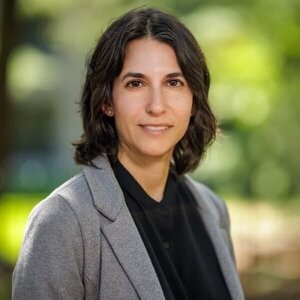#Girlmath: ND expert Sara Marcus reflects on how summer 2023 became the summer of the ‘girl’

For those attuned to what’s trending on TikTok, Instagram and other social media, summer 2023 has looked like the Summer of the “Girl,” according to Sara Marcus, an assistant professor of English at the University of Notre Dame and author of “Girls to the Front: The True Story of the Riot Grrrl Revolution.”

“That’s ‘girl’ in scare quotes, because the drivers behind trendy ideas like #girlmath, #girldinner and #ratgirlsummer are in their 20s and 30s, not elementary school,” Marcus said. “All three ideas quickly went viral this summer, raising the question: Why are all these grown women embracing the label ‘girl’ — decades after their feminist forebears fought to be considered adults and wore buttons demanding ‘Don't call me girl’?”
(For those who aren’t up on the latest TikTok trends, here’s a quick crib sheet: girl dinner is a collection of snippets from your pantry and fridge that you assemble when you’re home alone for dinner; “rat girl summer” is a summer spent scurrying around the city, snacking and not worrying about other people’s expectations; and girl math is the fictional calculations that let you feel more flush than you are.)
The answer to why grown women are embracing the “girl” label won’t be found on TikTok. But we can find an important clue in the economic statistics explaining that millennials — those of the precise demographic flocking online to hail their “girl” habits — are finding the dream of a self-sufficient adulthood receding before their eyes, Marcus said.
“Saddled with record student loan debt, facing pandemic-related career setbacks and confronting a society marked by drastic income inequality, today’s millennials have built far less wealth than previous generations had by the time they were the same age,” she said.
“Millennials are far less likely to own a house, have children or be married — all milestones that require money and that used to be viewed as the markers of being an adult.”
It’s no wonder, she added, that the tongue-in-cheek verb “adulting” also went viral not too long ago: When the idea of attaining actual adulthood seems impossibly distant, all you have left are little activities that make you feel, however temporarily and incongruously, grown up.
“This is also the generation who have tried to change the game. They have occupied Wall Street, they have marched for Black lives, they have pleaded for student debt forgiveness, but to very little lasting effect,” Marcus said. “So when you can’t change the game, you may as well laugh at it and at your place in it: at finding yourself, years after you’d expected to have grown up, still eating pantry scraps for dinner, still running around the city instead of heading off to a vacation rental, still imagining that the cash your friend gave you after you put dinner on your credit card is free money.
“Still living, in short, like a girl.”
Latest Faculty & Staff
- Faculty receive prestigious early career awards from National Science FoundationDuring the 2024-25 academic year, four researchers in the University of Notre Dame’s Colleges of Engineering and Science received early-career awards from the National Science Foundation.
- In new research, Roy Scranton explores climate change and the limits of human progressIn his most recent book, “Impasse: Climate Change and the Limits of Progress,” Scranton, an associate professor of English, defines the impasse he sees as “not only political and institutional, but cognitive, existential and narrative” and asserts that the only path forward is through embracing what he terms ethical pessimism. “A lot of people confuse pessimism with nihilism, apathy and despair,” Scranton said. “But pessimism is actually about recognizing our limits, letting go of unrealistic goals, finding solidarity in the fact of human suffering and doing what you can now, not in some utopian future.
- Joule Bergerson, energy technology assessment expert, named new director of ND EnergyND Energy faculty director Joule…
- In memoriam: Alasdair MacIntyre, the Rev. John A. O’Brien senior research professor of philosophy emeritusAlasdair MacIntyre, the Rev. John A. O’Brien senior research professor of philosophy emeritus and a permanent senior distinguished research fellow at the de Nicola Center for Ethics and Culture, died on May 21, 2025. He was 96.
- Santiago Schnell, dean of Notre Dame’s College of Science, appointed as provost of DartmouthSantiago Schnell, the William K. Warren Foundation Dean of the College of Science at the University of Notre Dame, has accepted an appointment as provost at Dartmouth College. He will depart Notre Dame at the end of June and begin his new role in July.
- Notre Dame’s Fightin’ Irish Battalion receives Department of Defense award as nation’s top Army ROTC programThe United States Department of Defense honored the University of Notre Dame’s Army ROTC Fightin’ Irish Battalion as the nation’s top Army collegiate program for the 2023-24 academic year. This will be the first time the unit has received the department’s Educational Institution Partnership Excellence Award, which recognizes the program’s achievements in recruiting, educating, training and commissioning leaders of character to be the next generation of military officers.












